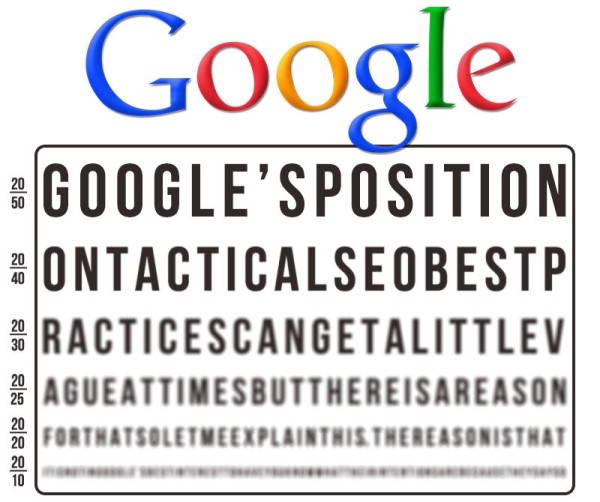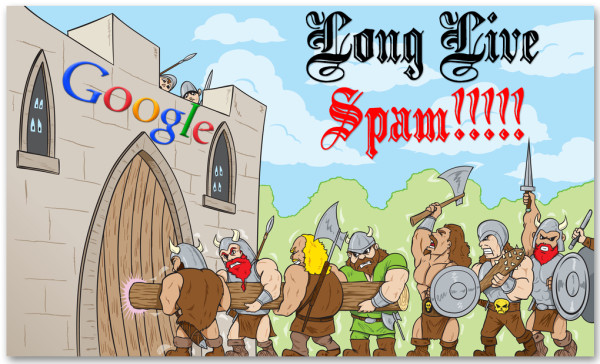Google And SEO Communications: Swahili Vs. Latin
There are many in the SEO community that get very frustrated with Google, and one of the reasons for this is simple: there is a communications gap. This is not a simple case of US English vs. UK English, but more like Swahili vs. Latin. Many publishers — and many who profess to be SEO […]
There are many in the SEO community that get very frustrated with Google, and one of the reasons for this is simple: there is a communications gap.
This is not a simple case of US English vs. UK English, but more like Swahili vs. Latin. Many publishers — and many who profess to be SEO professionals — get upset or angry every time Google communicates. In fact, I’d suggest this Eye Chart captures how many feel Google communicates:

In other words, people see that Google does a lot of communication but believe the search giant is deliberately vague and misleading about it. On the other hand, Google feels it is making every reasonable effort possible to be clear. Why does this gap exist? Let’s take a look.
Tactics Vs. Principles
The first part of this problem is that people are always asking Google about SEO tactics. Is this tactic ok? From Google’s perspective, some of these questions are like wolves in sheep’s clothing. To them, the flow of questions looks like this:
- Is guest posting ok?
- Is issuing press releases ok?
- Is participating in DoFollow networks ok?
- Is dropping links in thousands of forums ok?
- Is taking candy from a baby ok?
- Is writing great content ok?
- Is corporate corruption ok?
- Are links I received that I never asked for ok?
- Is incest ok?
- Is being interviewed by the New York Times ok?
- Is getting fantastic links as a result of sharing my content on social media ok?
Clear Tactics Invite Spammers
Even the very first question in the above list is controversial. Illustrated another way, the person who asks, “Is guest posting is ok?” may actually be asking, “Is it ok if I spew out thousands of article spun blog posts to low-quality sites that have no editorial judgment at all?” This is what Google fears every time they hear a question about a potential SEO tactic. In short, Google hears something like this: “Do you mind If I spam you this way?”
In addition, Google’s challenge is that being clear on a tactical level about what is and is not ok sets them up for spammers to become more effective. Any time Google provides clear guidelines on what is an ok tactic, spammers will begin to devise ways to abuse it, either from a quality perspective or a volume perspective (or both). For example, for the guest posting question, the answer really should be yes, but the SEO industry has scores of businesses that have totally abused that concept.
We can illustrate the way Google looks at the danger of communicating precisely on SEO tactics as follows:
Truth be told, I hate equating spammers with Vikings due to my Norwegian heritage, but you get the idea. As a consequence, Google focuses on discussing principles that publishers should follow. What they have to say ends up looking a lot more like this:
Principles Vs. Tactics
Google focuses on principles, because many of the questions get into gray areas. To go back to the guest posting example: done the right way, it is perfectly fine. Focus on very high-quality sites with strong editorial policies, and give them great stuff. Then back that up with a strong social media push (yes, promote your guest posts in your own social media feeds; it’s a great tactic), and promote the content effectively so it accumulates its own links. Hence, any attribution link back to you can gain some weight. This is in stark contrast to the article-spinning example I used above.
There is another reason for Google to be a bit vague on SEO tactics. Google is happy to have spammers wasting time pursuing tactics that Google can easily detect and discount. If Google provides too much clarity, the spammers will move on from tactics that don’t work to try other tactics that may not be so easy for Google to detect. A world in which spammers can easily expose themselves is a good thing.
Strategies That Build Authority
Don’t expect Google’s approach regarding clarity on SEO tactics to change. The best thing to do is to understand the principles they are espousing, take them to heart, and then focus on producing great stuff and promoting your business (and its content) very effectively.
From an SEO perspective, instead of looking for a tactical way to pile up the links, focus instead on strategies that build your real-world authority that result in your getting recognized by other established authorities. That is what Google wants you to do, and chances are pretty good that it is the best link building strategy you can employ, anyway!
Contributing authors are invited to create content for Search Engine Land and are chosen for their expertise and contribution to the search community. Our contributors work under the oversight of the editorial staff and contributions are checked for quality and relevance to our readers. The opinions they express are their own.
Related stories

